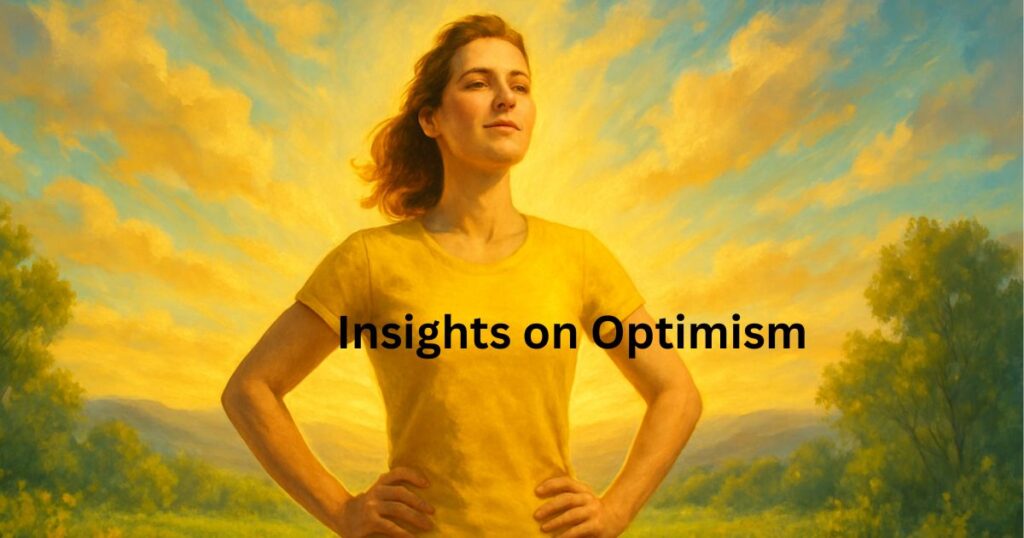Introduction-
Life can be tough and unpredictable, but staying positive gives us something to hold onto. Being optimistic isn’t just about being naturally cheerful—it’s actually a way of looking at life that affects how we act and how we treat others. It’s a mindset that helps us see what’s possible and deal with whatever comes our way. Let’s explore what optimism really means and look at how it can change lives.
What Optimism Really Means
At its heart, optimism means believing that life has good things to offer and that things can work out. It’s about facing tomorrow with confidence and hope. Different thinkers have looked at optimism in different ways:
- Finding Meaning in Uncertainty: Philosophers like Jean-Paul Sartre and Albert Camus knew that life could feel meaningless and hard. But they also realized we have the freedom to create our own meaning. This kind of optimism means accepting that life is uncertain, but choosing to live fully anyway and finding something beautiful in the experience.
- Optimism That Gets Results: Philosopher William James believed that staying positive actually helps make good things happen. When we’re optimistic, we solve problems better, bounce back faster, and generally feel better about life. It’s not about sitting around hoping for the best—it’s about actively looking for opportunities and possibilities.
- Staying Calm and Focused: Ancient Stoic philosophers like Epictetus and Marcus Aurelius taught a practical kind of optimism. They said to focus on what you can control and accept what you can’t. When you build that kind of inner peace, you can face hard times with strength and see problems as chances to learn and grow.
Why Optimism Matters
Optimism isn’t just an interesting idea—it actually makes a real difference. Scientists have found that optimistic people tend to be healthier, both mentally and physically. They live longer, think more creatively, and handle problems better. When things go wrong, they keep going. They have better relationships and feel more satisfied with their lives overall.
What’s more, optimism spreads. When you’re positive, it lifts up the people around you. On a bigger scale, when communities stay hopeful together, they can accomplish amazing things and work toward shared goals.
“Elara and the Seeds of Hope”

In a small village tucked between green hills and thick forests, there lived a young girl named Elara. Even as a child, she had something special about her—a kind of light that seemed to come from within. While others saw problems, she saw possibilities. While others worried, she wondered what could be.
The village was beautiful, but life there wasn’t easy. The families who lived there farmed the land for everything they needed. But lately, the weather had turned unpredictable. Some years brought too much rain, other years not enough. Crops failed. Harvests shrank. Fear crept into people’s hearts like a cold fog, and conversations at the market grew heavy with worry about what tomorrow might bring.
But Elara didn’t see it that way. She couldn’t shake the feeling that something better was waiting just around the corner. She spent hours with the village elder, a woman named Moira who had lived through good times and bad. Moira saw something rare in Elara—a spark that refused to dim—and she fed it with stories of people who had survived impossible things and come out stronger.
One evening, as the sun painted the sky orange and pink, Elara sat beside Moira near the crackling fire. The old woman studied the girl’s face, then asked softly, “How do you stay so hopeful, child? When everyone else is afraid?”
Elara’s eyes caught the firelight as she smiled. “I think every hard thing that happens is trying to teach us something. Even when everything looks dark, I know the sun is still there, just waiting to come back out.”
Moira felt something warm spread through her chest. “Hope is powerful, Elara. It can light up even the darkest road and take us places we never dreamed we could go.”
Those words stayed with Elara. A few days later, she did something bold. She called a meeting and asked everyone in the village to come. When they gathered, curious and a little skeptical, she stood before them—this young girl with fire in her eyes.
“I know things are hard right now,” she said, her voice steady. “But I also know we’re stronger together than we are alone. And I think we can find a way through this.”
Then she shared her idea: What if they stopped putting all their hope in one type of crop? What if they tried growing different things and shared what they learned with each other? What if they pooled their tools, their seeds, their knowledge—and faced this challenge as one?
At first, there was silence. Then someone asked a question. Someone else offered a suggestion. Slowly, like a flame catching on dry wood, hope began to spread through the room. Elara’s optimism was contagious.
The road ahead wasn’t smooth. They made mistakes. Some experiments failed. There were moments when people wanted to give up, when the old fears came rushing back. But every time doubt crept in, Elara was there—not ignoring the problems, but reminding everyone what they were working toward. She celebrated every small win. She learned from every setback. And her belief in what was possible kept everyone moving forward.
Season by season, something remarkable happened. The fields that once grew only one struggling crop now burst with variety. The cooperative they’d formed became the heart of the village, a place where people shared not just resources but encouragement and ideas. What once felt impossible—stability, abundance, hope—became their everyday reality.
And it all started because one young girl refused to accept that hard times were all there was.
Conclusion: What Optimism Can Do
Elara’s story isn’t just a nice tale—it’s proof of what optimism can actually accomplish when combined with courage and action. It shows us that staying positive isn’t about pretending problems don’t exist. It’s about choosing to focus on what’s possible instead of just what’s wrong.
For anyone reading this, especially those just starting out in life, here’s what matters: optimism isn’t something you’re born with or without. It’s something you can choose. It’s something you can practice. It’s something you can build, day by day, decision by decision.
In a world that often rewards cynicism and celebrates pessimism, choosing optimism is actually an act of rebellion. It’s saying, “I refuse to believe this is all there is. I refuse to accept that nothing can change.” It’s looking past today’s struggles and daring to imagine a better tomorrow.
Optimism doesn’t mean ignoring reality. It means choosing to see reality through a different lens—one that notices not just what’s broken, but what could be fixed. One that recognizes not just the obstacles, but your own power to overcome them.
The psychiatrist Viktor Frankl, who survived the Holocaust, once wrote: “When we are no longer able to change a situation, we are challenged to change ourselves.” That’s what optimism really is—the willingness to transform yourself so you can transform your circumstances.
It’s about believing you have the power to make things better. It’s about getting back up when you fall. It’s about lighting a candle instead of cursing the darkness.
Optimism is a gift you give yourself. And when you carry it with you, you give it to everyone whose life touches yours. It ripples outward like light, reaching places you’ll never even know about.
So cultivate it. Protect it. Share it. Let it guide you through life’s complexities with courage and grace. Because in the end, the way you see the world shapes the world you see. And choosing to see hope, possibility, and potential isn’t naive—it’s one of the bravest things you can do.


